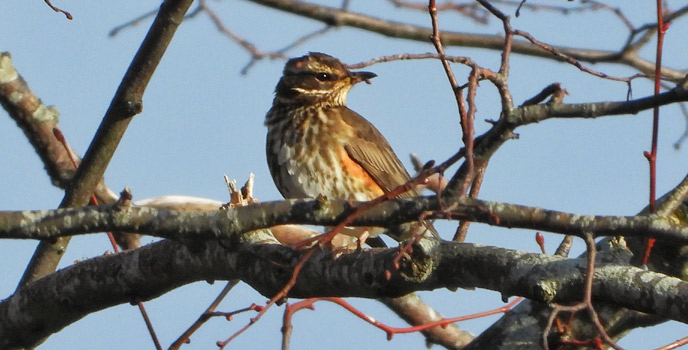Cabinteely Park - 13th January 2019.
Click on pictures to view the full size image. Use the up and down arrows on your keyboard to scroll through them or click on slideshow and sit back.

South Dublin Members in Cabinteely Park, 13th January 2019 (picture: Bill Rea)
We began 2019 with a visit to the always reliable Cabinteely Park. It's mixture of woodland, parkland, stream and man-made pond make it an attractive haven for both birds and birders alike and has been a favourite destination for branch outings for many years. The varied landscape, crisscrossed with meandering trails and paths ensures a wide variety of birds to enjoy from wildfowl to song birds.
We had a 10:30 start, when about 40 South Dublin members assembled in the main car park where they were greeted by Branch Chairperson Eleanor Keane and committee member Frank Doyle. It was a fine clear day with excellent light but definitely on the chilly side thanks to a stiff northwesterly wind. As always we followed an anti-clockwise circuit of the park.

Blackbird, Cabinteely Park, 13th January 2019 (picture: Bill Rea)
The first leg took us along paths that cut through the forested area behind Cabinteely House. This area is home to typical woodland species and we managed to see and hear Blue, Great and Coal Tits, Goldcrest, Blackbird, Song Thrush, various Corvids and Woodpigeon all in small numbers.
We also had regular passing troupes of Long-tailed Tits, sometimes at very close quarters. These delicate birds are a joy to behold and in winter are usually encountered in small vocal flocks. Long-tailed Tits build beautifully intricate domed nests that can take up to a month to construct. They pack them with feathers and bind them together using spider webs and lichens. Despite the name, they are not true tits, instead being closely related to nine species of Bushtits found across central and far-eastern Asia, whereas closer to home their nearest relatives are Warblers, particularly the Phylloscs.

Redwing, Cabinteely Park, 13th January 2019 (picture: Gustavo Zoladz)
We next headed towards some open parkland that lies adjacent to Brennanstown Road where some thrushes were feeding in the grass. The majority were Redwing, a winter visitor from Scandinavia and Iceland. Disturbed by walkers they took flight, revealing the red underwings that gives their name.
As we watched the Redwing we heard the familiar twittering call of Goldfinches coming from somewhere to our left, and sure enough we soon spotted about fifteen that were flitting about among the hedges and bare trees, then taking flight in smaller groups. There has been an increase in their numbers in recent years and it has been suggested this has coincided with a change in behaviour that has seen them learning how to take advantage of garden feeders.

Little Grebe, Cabinteely Park, 13th January 2019 (picture: Gustavo Zoladz)
We left the finches and thrushes behind and made our way slowly towards Cabinteely Stream and Pond, but soon stopped to watch two Mistle Thrushes, our fourth thrush on the day. They paraded about in their characteristic upright stance for some time before suddenly flying off strongly for no apparent reason. Mistle Thrushes are one of the earliest species to breed and can be sitting on a first brood even by the end of February, so we guessed these two were a pair.
We had a good scan along the stream in both directions hoping for Kingfisher, but it did not oblige us this time. On the pond were good numbers of Mallard, Moorhen and Black-headed Gull as well as single Little Grebe and Herring Gull.

Grey Wagtail, Cabinteely Stream, 13th January 2019 (picture: Bill Rea)
We strolled along the stream's bank between its two bridges and had Grey Wagtail twice, once about mid-way and again at the further off bridge. Possibly two birds or just the same one moving about, we couldn't say for sure? Either way they are great to see and it was remarked they are easily the most incorrectly labeled bird on the Irish list, but 'Yellow Wagtail' must have been already taken. Also seen from the bridge was a Little Egret that was initially standing on a rock. As we watched it moved off, slowly making its way down to the stream where it began fishing. We left them behind and headed up the hill back to the car park to finish up.
Some More Pictures
Some more pictures taken on the day by Bill Rea, Gustavo Zoladz and Joe Hobbs.
Click on the picture and then use the left and right arrows to scroll through them.
However, passing Bramble's Cafe on the way some decided to drop in for a very welcome mug of coffee and a chat about birds seen and missed. Despite not having Treecreeper or Kingfisher during the outing we were very happy with the morning's work and have got 2019 off to a great start.

